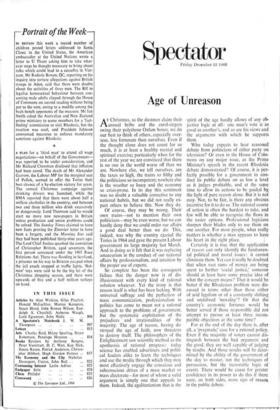Age of Unreason
ATA T Christmas, as the dustmen claim their bribe and the carol-singers swing their polythene Oxfam boxes, we do our best to think of others, especially over- seas, less fortunate than ourselves. Even if the thought alone does not count for so much, it is at least a healthy mental and spiritual exercise; particularly when for the rest of the year we are convinced that there is no one in the world worse off than we are. Nowhere else, we tell ourselves, are the taxes so high, the trains so filthy and the politicians so incompetent; nowhere else is the weather so lousy and the economy so crisis-prone. In its day this sentiment was no doubt a valuable corrective to any national hubris, but we did not really ex- pect others to believe this. Now they do.
Of course, they may be wrong. Their own trains—not to mention their own politicians—may be even worse, but we can hardly deny that we could order our affairs a good deal better than we do. This, indeed, was why the country ejected the Tories in 1964 and gave the present Labour government its large majority last March. And in doing so it felt that it was replacing amateurism in the conduct of our national affairs by professionalism, and intuition by the proper use of experts.
So complete has been the consequent failure that the danger now is of dis- illusionment with every kind of rational solution whatever. Yet the irony is that reason itself is what has been lacking. With universal suffrage and the perfection of mass communication, professionalism in politics has come to mean not a rational approach to the problems of government, but the systematic exploitation of the prejudices and irrationalities of the majority. The age of reason, having de- stroyed the age of faith, now threatens to destroy itself. The philosophers of the Enlightenment saw scientific method as the apotheosis of rational progress : today science has enabled advertisers and politi- cal leaders alike to learn the techniques and use the media through which they may most effectively engage the conscious and subconscious drives of a mass market or mass electorate—for most of whom a valid argument is simply one that appeals to them. Indeed, the egalitarianism that is the spirit of the age hardly allows of any ob- jective logic at all : one man's vote is as good as another's, and so are his views and the arguments with which he supports them.
Who today expects to hear reasoned debate from politicians of either party on television? Or even in the House of Coin- mons on any major issue, as the Prime Minister's speech in the recent Rhodesia debate demonstrated? Of course, it is per- fectly possible for a government to con- duct its public debate on as low a level as it judges profitable, and at the mule time to allow its actions to be guided by, the light of pure reason alone. But it is not easy. Nor, to be fair, is there any obvious incentive for it to do so. The rational come of action is often the hardest to take, and few will be able to recognise the flaws in the easier options. Professional logicians sharpen their blades only to use them on one another. For most people, what really, matters is whether a man appears to have his heart in the right place.
Certainly it is true that the application of reason can only identify the fundamen- tal political and moral issues : it cannot eliminate them. Yet can it really be doubted that when vast sums of money are being spent to further 'social justice,' someone should at least have some precise idea of what the concept means? That it would be better if the Rhodesian problem were dis- cussed in terms other than those either of arid legalism or of a constantly shifting and undefined 'morality'? Or that the country's economic fortunes would 'be better served if those responsible did not attempt to pursue at least three incom- patible objectives at the same time?
For at the end of the day there is, after all, a 'pragmatic' case for a rational policy. Even if the majority of voters cannot dis- tinguish between the bad argument and the good, they are well capable of judging by results. And those results will be deter- mined by the ability of the government. of the day to master, not the techniques of persuasion, but the inexorable logic of events. There would be cause for greater confidence in its power to do this if there were, on both sides, more sign of reason in the public debate.






























 Previous page
Previous page